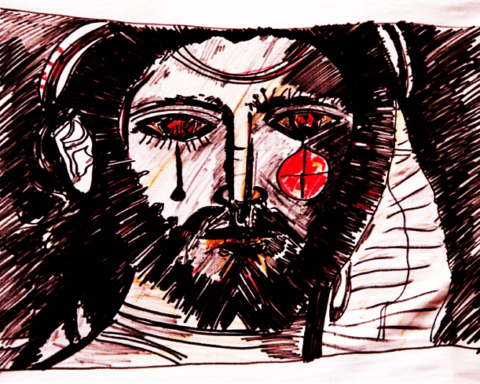The story of the Canaanite woman infuriates me.
Commentators and scholars, particularly male identifying ones, that focus on this woman’s persistence (which is notable) often make me wonder why we can’t hold Jesus accountable for his actions toward her? Breaking down this story we see that Jesus, after he gives his speech about defilement by mouth, goes to Gentile territory. And an unnamed Canaanite woman approaches Jesus and begs him for mercy because her daughter is tormented by a demon. And the first response of Jesus is to ignore her. The disciples around him, in their often suspiciousness of folk approaching Jesus, tell Jesus to send her away because she is causing a scene – she is shouting – tone policing. To defend himself he offers up the narrow focus of his ministry – the lost sheep of the house of Israel. And in her desperation for her daughter’s wellbeing, she asks him for mercy again. “Lord, help me!” she shouts. And in the second response of Jesus, he dismisses her with an insult that places this woman in an inferior space. She is compared to a dog under a table.
The dismissal of women, specifically women of color and “otherness” plagues our world. We are seeing the ramp up of racist rhetoric towards a woman who would be the first woman and the first Black woman to hold the seat of the Vice President of the United States. We see the killers, the policeman, who murdered Breonna Taylor, a Black woman in Louisville, untouched by the judicial system while she is forgotten in the mainstream media. We see Black women and girls being ignored because they are seen as dispensable worthy of no one’s time. This Canaanite woman is Kamala Harris. She is Breonna Taylor. She is the Black and Brown and Indigenous women and girls who are deemed as unworthy…they are this unnamed Canaanite woman.
Canaanites were the occupiers of the land that was promised to the Hebrews by God. They were seen as the “other” and during this whole time, it is not a shocking revelation, Jesus was living into his Jewishness and a descendent of the Hebrew people. Jews and Canaanites were enemies though some married and Christ himself had Canaanite people in his lineage.[i] But this idea of “otherness,” this deep history, this deep misogyny clouds the mind and soul of Jesus. And we need to talk about that. We need to talk about how Emmanuel, God with us, dismisses and demeans a woman who is different in culture and in creed than he. We must talk about it because it is happening all around us! Because men, like me, and the patriarchal church mirror these actions and are often not held accountable.
The church, theologized and built mostly by privileged, white, men, often dismisses the otherness of women, queer folk, trans people, non-binary siblings, and anyone that does not fit the heteronormative, white mold. No matter the confession, no matter the textual evidence, no matter the words spoken, it is often the case that God’s holy space and community ignores those whom society and church deem different. And we have to talk about that. We have to hold the church accountable for these actions.
The narrowness of the mission of Jesus at this moment in this story parallels the narrowness we find ourselves in right now. Jesus, just before this encounter, tells the crowd that what comes out of our mouths, the things that we say and the things that come out of our hearts, is what can defile us. Jesus in meeting this Canaanite woman forgets this. What comes out of his mouth goes against everything he tells his followers because to him, this woman is below, inferior to his followers – the insiders. The narrowness of insider vs. outsider creeps into Jesus. And yet, there is a transformation that evolves out of this encounter.
Mitzi J. Smith, in her short commentary of this pericope, reminds us of the contextual importance of both Jesus and the Canaanite woman. She says that “Greeks and other Gentiles had a more familiar relationship with household pets, particularly with dogs, than did the average Jewish person.”[ii] After Jesus tells this woman that “it is not fair to take the children’s food and throw it to the dogs,” she responds from her own contextual experience, “Yes, Lord, yet even the dogs eat the crumbs that fall from their master’s table.” And in this moment, something changed in Jesus. Did he realize he was being an arrogant misogynist? Did he catch himself being a hypocrite? Did he finally feel empathy for someone he was taught to despise? We will never know the answer to those questions, but what we do know is that Jesus was checked by this woman and held accountable. Gail R. O’day says, “The Canaanite woman knows who Jesus is and holds him to it; she will not settle for a diminishment of the promise.”[iii]
After a moment of education and accountability from this woman, Jesus not only healed her daughter, he would later go on to minister to the Gentiles and open up his ministry. But I always wonder, why didn’t the disciples say something? Why did this woman have to hold Jesus accountable for his misogyny and xenophobia? I wonder how that must have felt to her and if she was traumatized by it? This woman has nothing to do with Jesus’ shortcomings and yet, she is put in a position by society and scholarship to convince Jesus she is worthy of his healing. She shouldn’t have had to hold him accountable for it is not the job of the oppressed to hold their oppressor accountable. The disciples, the men following Jesus, should have stepped up but instead they escaped into their role as male and also dismissed the Canaanite woman.
The church is in a moment in history where accountability is needed and yet criticized. When people of color are asked to educate white people about racism instead of white people doing the work themselves. When the church cannot hold itself accountable for the misogyny and patriarchal structures it perpetuates and instead powerful, strong, bold, and persistent women, queer people, and the “other” must use countless amounts of energy to call out and change the church system. What if we men actually held each other accountable? What if the church held itself accountable? What if we called each other out and did our own work? How much would our ministry expand?
The Canaanite woman is persistent, bold, a damn good mother, and an unnamed figure that though insulted and verbally abused, changed the course of Jesus’ ministry and opened his heart. And she also speaks to us today saying that she should not have had to do that. She should not have had to be insulted and ridiculed and made to educate a bunch of men in order for her daughter to be made well. May we also name this woman as a pillar of our faith to remind us that we must hold ourselves and the church accountable to further the kin-dom of God while never placing the oppressed in a position to do that accountability for us. Jesus was held accountable and it changed the trajectory of his mission, will we do the same thing without traumatizing the other? Because the mission of our church is at stake and our siblings of color, our siblings who are queer, our siblings who are this Canaanite woman, are tired.
[i] [i] Mitzi J. Smith, “When Jesus entered Tyre and Sidon, an indigenous Canaanite woman formed a one-woman welcoming committee,” WorkingPreacher.org, 2017.
[ii] Ibid.
[iii] Gail R. O’Day, “Surprised by Faith: Jesus and the Canaanite Woman,” in A Feminist Companion to Matthew, ed. Amy-Jill Levine (Sheffield, England: Sheffield Academic Press: 2001), 125.
Lee Catoe is the Managing Editor of Unbound and the Associate for Young Adult Social Witness for the Advisory Committee on Social Witness Policy for the Presbyterian Church USA.





Unbound Social